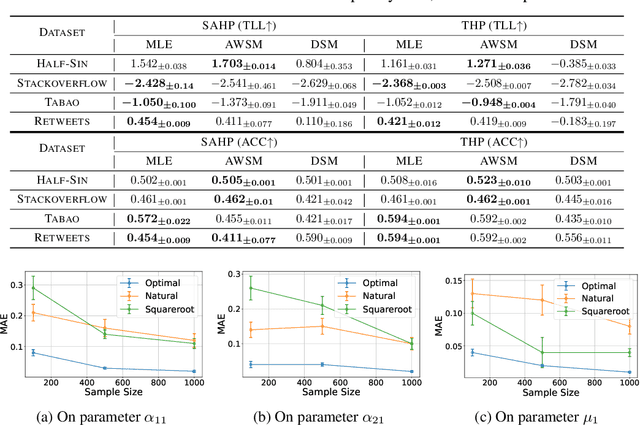Zizhuo Meng
Is Score Matching Suitable for Estimating Point Processes?
Oct 05, 2024



Abstract:Score matching estimators have gained widespread attention in recent years partly because they are free from calculating the integral of normalizing constant, thereby addressing the computational challenges in maximum likelihood estimation (MLE). Some existing works have proposed score matching estimators for point processes. However, this work demonstrates that the incompleteness of the estimators proposed in those works renders them applicable only to specific problems, and they fail for more general point processes. To address this issue, this work introduces the weighted score matching estimator to point processes. Theoretically, we prove the consistency of our estimator and establish its rate of convergence. Experimental results indicate that our estimator accurately estimates model parameters on synthetic data and yields results consistent with MLE on real data. In contrast, existing score matching estimators fail to perform effectively. Codes are publicly available at \url{https://github.com/KenCao2007/WSM_TPP}.
TransFeat-TPP: An Interpretable Deep Covariate Temporal Point Processes
Jul 23, 2024Abstract:The classical temporal point process (TPP) constructs an intensity function by taking the occurrence times into account. Nevertheless, occurrence time may not be the only relevant factor, other contextual data, termed covariates, may also impact the event evolution. Incorporating such covariates into the model is beneficial, while distinguishing their relevance to the event dynamics is of great practical significance. In this work, we propose a Transformer-based covariate temporal point process (TransFeat-TPP) model to improve the interpretability of deep covariate-TPPs while maintaining powerful expressiveness. TransFeat-TPP can effectively model complex relationships between events and covariates, and provide enhanced interpretability by discerning the importance of various covariates. Experimental results on synthetic and real datasets demonstrate improved prediction accuracy and consistently interpretable feature importance when compared to existing deep covariate-TPPs.
 Add to Chrome
Add to Chrome Add to Firefox
Add to Firefox Add to Edge
Add to Edge